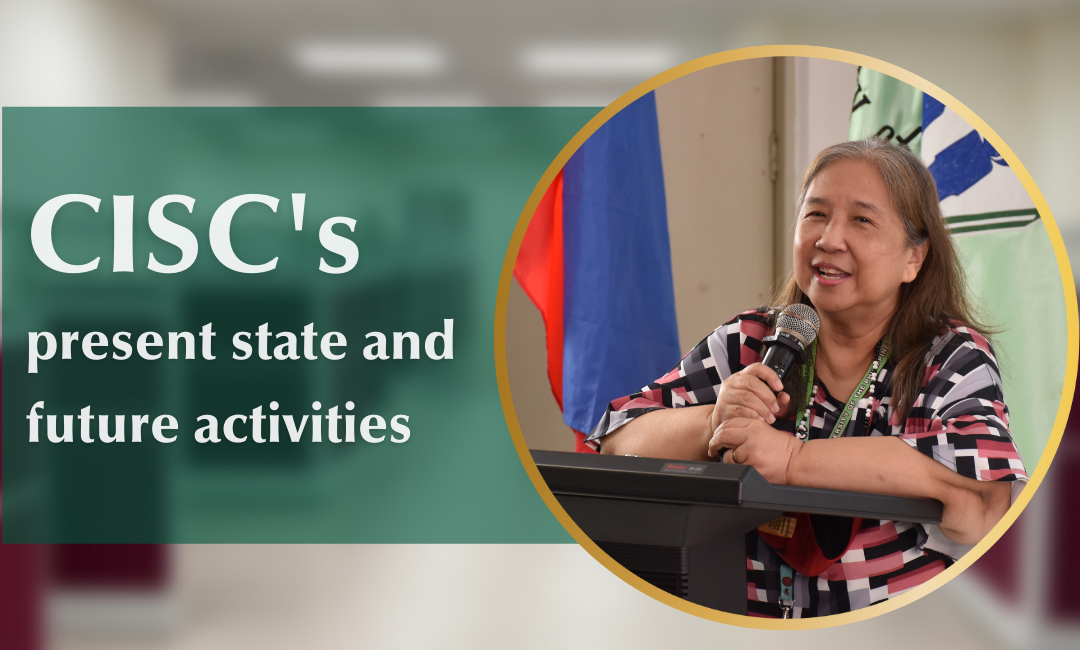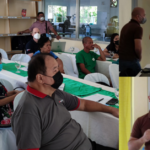Before her three-term ends on May 31, Dir. Blanquita R. Pantoja of the Community Innovations Studies Center (CISC) of the UPLB College of Public Affairs and Development (CPAf) shared the current state of CISC and her suggested directions for the new Center director. Attended by CPAf staff, the event was held on Mar. 18 at CPAf and via Zoom.
CISC was created as one of the research centers of CPAf in 2011 and its research areas include community education, communities in transition, and community-based strategies for sustainable development. Dir. Pantoja, the outgoing CISC head, has been serving the Center since 2013. In her presentation, she discussed what she saw as the Center’s strengths, weaknesses, opportunities, and threats. She also shared the challenges that they have encountered through the years and their planned activities in the future.
According to Dir. Pantoja, most of the research activities of CISC support the academic programs of CPAf. However, she mentioned that research collaboration with CPAf faculty needs to be improved.
A highly emphasized strength of the Center is its hardworking and competent researchers whose academic background is related to the research areas of CISC. Dir. Pantoja shared that most of the CISC researchers can prepare project proposals. However, the Center also has limited staff who can lead research projects because of the University policy on project leadership, which requires a graduate degree. At present, four of the 10 CISC researchers have completed their MS degrees. Others are currently pursuing their graduate studies.
With the current academic load of its researchers, administrative duties of two researchers, and two vacant items, Dir. Pantoja noted the limited time of CISC staff for research and extension (R&E) activities.
Nevertheless, CISC has conducted several research projects and established linkages with various government agencies, international institutions, and people’s organizations.
Likewise, Dir. Pantoja mentioned that CISC has been working with different local government units for capacity building, baseline studies, and establishment of monitoring and evaluation system. She anticipated, however, possible competition later with other service providers.
This year, Dir. Pantoja shared that CISC will conduct a new research project with the Department of Agriculture (DA) – Bureau of Agricultural and Fisheries Product Standards and two R&E programs with the Department of Trade and Industry and DA. Proposals on capacity building of community organizations and technical assistance program for women’s organizations in Laguna 2nd District are likewise being prepared. Other target research projects are related to agrarian reform and preparation of Laguna Industry Development Plan. CISC researchers will also produce journal articles and a conference paper presentation.
“I hope the next Director would also consider these [research programs and projects] along with his/her own specific projects in mind,” Dir. Pantoja said.
She also gave some recommendations for the next CISC director. To strengthen R&E collaboration with CPAf faculty, a research fellow appointment can be given to faculty members, Dir. Pantoja suggested.
Moreover, she proposed the conduct of CISC planning workshop prior to the CPAf Strategic Planning Workshop in July 2022. She emphasized the need to align the plans and programs of the Center to UPLB’s Accelerating Growth through One Research and Extension in Action (AGORA) program.
Finally, she mentioned management concerns including the filling up of items, permanency of staff, and budget allocation for vehicle maintenance. She also encouraged to continue supporting skills enhancement as well as coaching and mentoring of CISC staff.
Dir. Pantoja ended her presentation by sharing her expectations from the new director. “One should have an established linkage and solid experience on grassroots-level R&E, and most importantly, he/she will have to look back at the roots of CISC, which is agrarian reform and community education,” she said.



